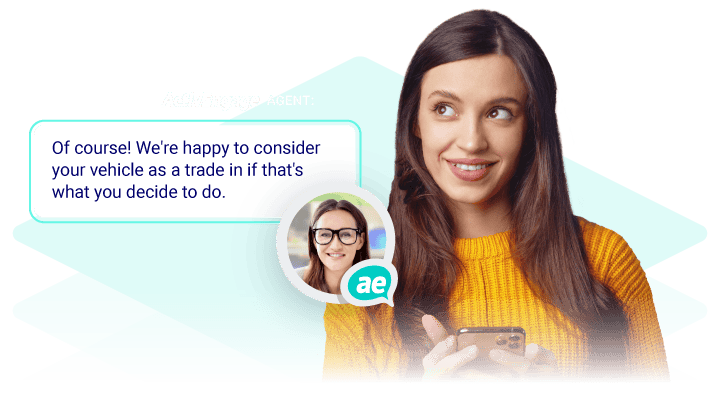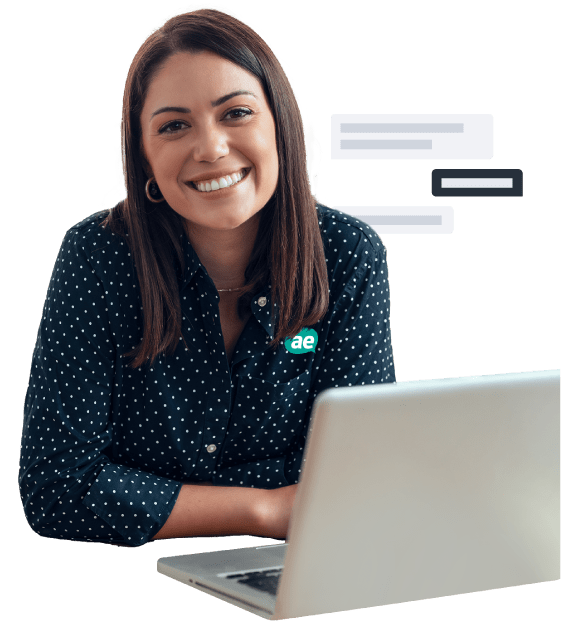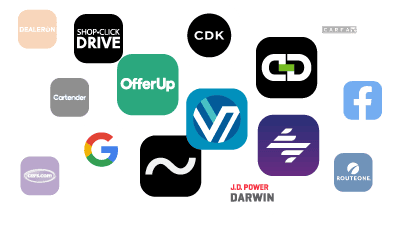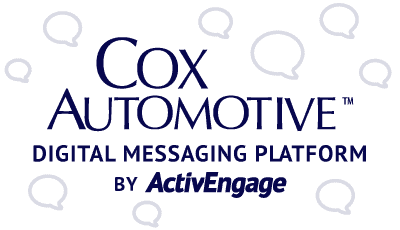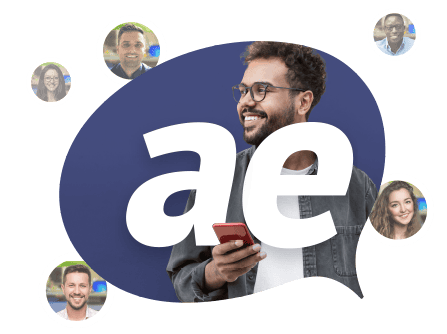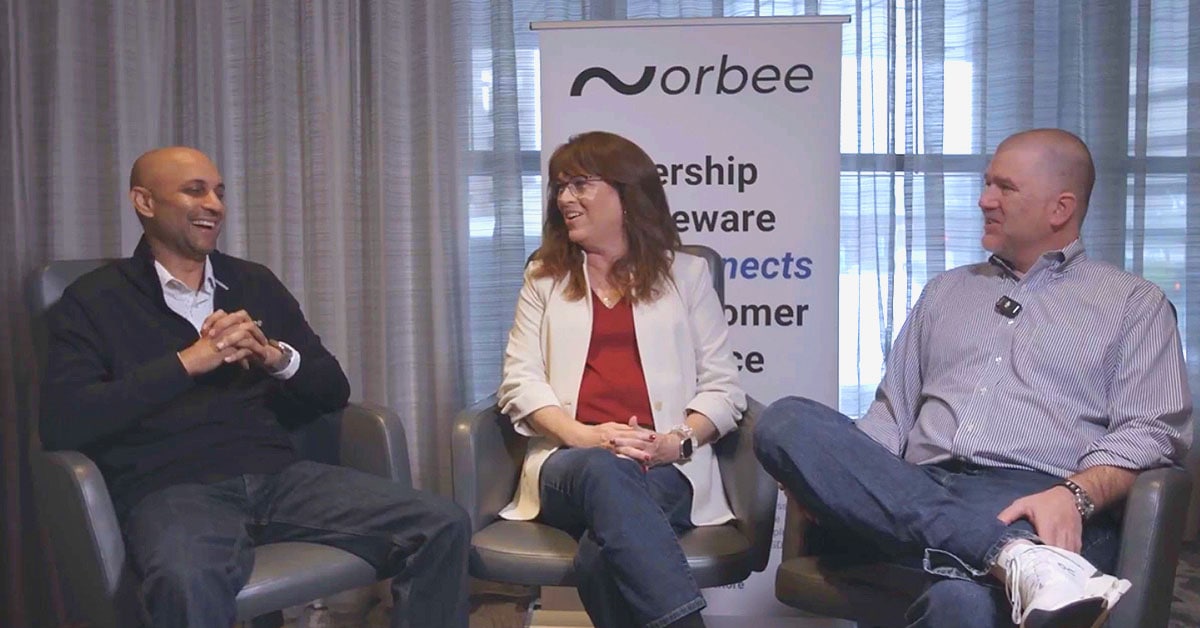Atul Patel: Hey, everybody, thanks for joining Atul Patel here, co founder and CEO of Orbee. I'm with Carol and Eric from ActivEngage. Thanks for joining me where we're at the Kain 2024 event. It's always fun to get together around this. I feel like it's a balance of vendor networking, which is exactly what we're doing here with integration work and having these sort of thought leader dealerships coming to the table. So introduce yourselves and kind of what you're doing.
Carol Marshall: Carol Marshall, CEO of ActivEngage, I was lucky enough to present yesterday, as as you so astutely pointed out, it is thought leadership, it's a thought leadership type conference, and really smart dealers, really smart vendor partners, and I felt the presentations were all well done yesterday and provided some points to really, as I say, 'noodle', and help make informed decisions about moving forward in the ever ever changing market these days. So, excited to be here excited to talk with you and talk about our integration. But I'll let Eric introduce himself.
Eric Schlesinger: Eric Schlesinger, I'm the Chief Revenue Officer with ActivEngage. I've been in this crazy business now for awhile, I'm really gonna date myself. 34 years. And I agree with Carol, I mean, this is always one of the best events I think in the industry. It really, the small uniqueness of it and the people that attend, even from the vendor side, what's interesting is so many of us have known each other for I mean, I've known some of the people that are here for 25 plus years. Yeah. So it's interesting to look back with some of them in retrospect, like we were just talking here beforehand, about, how internet leads used to be delivered to the dealership via fax machine. Kind of counterintuitive. But you know, we've evolved a little bit.
Carol Marshall: When you explain that to the digital natives in our business today that we had a fax machine for internet, it really crushes their heads.
Atul Patel: Fax machines last longer than ADF lead posts, you know, they might be competing.
Eric Schlesinger: What's interesting is that there are still some places that require you to use fax machines like doctor's offices because of HIPAA compliance as an example. If they don't have an online secure portal, you can't email. They're like, 'fax us'.
Atul Patel: Yeah, well, let's talk about this. Because that's a speed thing, in my opinion, and kind of the real time nature of how the world's gotten. Talk a little bit about ActivEngage, and how you guys are so deeply involved in that real time interaction with the customer.
Carol Marshall: The way we keep it real time as we keep it unscripted. So we have live human agents from the moment someone lands on a dealership website. Our response time is under 20 seconds to start a conversation, and it's unscripted. And so it's whatever is most important to that shopper. That's where the conversation starts. And yet the agents are trained to, 'Let's find out if they have a trade. What is their timeline to purchase? What other vehicles might they be open to? What's the most important thing?' Getting the hot button, right? And so we build that relationship, usually in a 10-12 minute conversation, or if we're scheduling service, it's more like an 18 minute conversation. But that's okay. We don't, measure handle time as a KPI for our team. It's all about building that relationship and getting pertinent information. So then the dealership team can respond in the correct way. But today's market will pay a little more for a great customer experience. And how can the dealership team really know how to respond to that shopper, If they don't know what's most important to them?
Atul Patel: Right. So well let's talk about so obviously, these are real people that are interacting on the other end, which I think there's still a huge opportunity to have real people like there's a lot of talk about AI and all that and we certainly are big fans of where it's going to eventually go with all the data. But even now processing the amount of customer journey signals and so forth, still takes a human touch.
Eric Schlesinger: It does and we're not against AI in any way shape or form. But when it comes to the interaction between the dealership and a consumer whenever purchasing a vehicle, or for that matter scheduling a service appointment, it's important to remember that human connection. A vehicle purchase, obviously, it's the second largest purchase that most of us happen to mak e. it's the largest emotional purchase, that we make. When you're learning how to sell cars at least 30 years ago, one of the very first things I was taught as an example is if that customer comes in they're interested in that silver Honda Accord. At least that's what they think they want. What is it that we were taught to do? We were taught to take them out to the lot we were taught to walk by as many cars as you possibly could on the way to that silver LX Accord that's all the way in the back of the lot. And why was that? Because we know that when they're walking by that red EX V-6, two door coupe Accord, they're gonna be like, 'Atul, I want that car'.
Atul Patel: Yeah, yeah.
Eric Schlesinger: And you can't get to that point with the computer. It's kind of like, when we see the conversation that comes in, and the customer sits there and says, 'I need to get a new car. My daughter was in a really bad car accident. Last night, the vehicle, it was totaled.' And the AI is response typically is, 'Oh, that's really great to hear.'
Carol Marshall: Yeah. And we're working with an AI company to develop an assistant for the agent.
Atul Patel: For the agent, Right? That's a big area of kind of how we implement AI at at Orbee. We started first as tools for employees. Employees that have earned it right, so you can't cheat your career with it. And then the next level is, 'How do we implement AI as as software support to our customers, our dealerships?' and then maybe in the future, it starts to interact with the consumer. Because there's there's that technicality that you could say something insensitive and whatnot. But going back to the emotional nature of car buying, and sort of walking the lot. That sort of makes me think about VDP views, right? and the fact that you have these journeys that we see that spans so many price ranges, you know, it's one person looking at wide set of vehicles. You can almost signal that this person's a window shopper, or they're undecided, or they're transitioning from a minivan to a SUV, and they're not sure. I mean, 'I'll be honest, I'm thinking about a bigger vehicle, and there's like, six big options, to pick from.' And so being able to use that signal data, let's talk about that is when you are able to collect all that in one place, and then process it and almost compile it. Talk to me about how agents have these sort of 'cheat codes', if you will. The summary UI that, to be able to process that and speak to the person about it
Carol Marshall: Yeah, it allows them to see that shopper, 'I know who you are. I know you started here and now you're way over here.' And so it allows the agent to formulate pertinent questions right? Old old movie Uncle Buck, I don't know if anybody but where the kid just asks question after question. 'I'm a kid, that's my job.' That's not our job is just ask ask, ask, ask but to formulate pertinent intelligent questions pertaining to exactly what you said: the journey that they've taken to get to that spot.
Atul Patel: Right, now, and there's always this sort of challenge that people talk about is, 'I don't want to creep the consumer out.' But I think there's something shifting here where the consumer expects that the retailer, the business they're interacting with knows, just like if I cancelled an appointment for my vision appointment. I don't want to call the number and they not know that I did that. So, how are you seeing that play out in terms of the creep factor?
Eric Schlesinger: Well it's still creepy, but you're right, I think more and more consumers are coming into the realization that, companies, whether it's, your cell phone provider, your internet provider, like there is a lot of information that's already being shared. And we had to just implement a whole thing, because of cybersecurity and everything where, unfortunately, we had to put some software in our stuff. In my opinion on that was basically like, 'We're being tracked anyway.' But to your point, there's an expectation at the same time as well, like you said that we know what the consumer is doing, where they came from, how they got there, when they sit there, and they're looking at a specific vehicle on a VDP. They're not expecting that they have to tell us what vehicle they happen to be looking at. They're expecting us to know what vehicle they're looking at.
Carol Marshall: Some consumers will even say, 'You see, you see what I'm looking at right?'
Atul Patel: Yeah, that's a great point.
Carol Marshall: And they'll just come forth with it. And that used to not be the case, but it is today. And what I found sad last week, every week, each team leader nominates the best chat of the week, and there was a chat where the shopper came in and gave name, email, phone number, 'I'm interested in this car.' That is someone who expected to be talking to a bot and didn't want to talk to a bot. Just wanted someone. An exasperated, frustrated person. Because when we first started in 2007, people chatted like a Google search.
Atul Patel: Yes. Right.
Carol Marshall: And they put in 'Ford Explorer', and then that's it, right. But what our agent did with that start was like, 'I'm so happy to see you're interested in this, what a great vehicle I love, whatever feature it was.' And it became a 12 minute conversation. And at the end, there was an appointment set. And the shopper was really excited to come in and drive that vehicle.
Atul Patel: That's incredible. So when you think about how to even make this information readily available to these agents, it takes a lot of integration work, right? Because there's a lot of touch points. Even in a dealership website, you have different tools that are involved in that whole process: digital retailing, the chat the trade in tool. And I expect new ones to keep coming up, right. And so, our work at Orbee is all about kind of serving as the middleware to connect all these pieces into, to pull in some of your guys's engagement data to make other decisions smarter, like ad buying, and so forth. And then do it the other direction as being able to feed that back to those agents behind your guys's capability to be smarter with how they interact. Talk a little bit about how you've been in this industry, you said it, I didn't for a while and talk about how you've seen integrations evolve.
Eric Schlesinger: Oh, I mean, it's remarkable. I mean, we sit there and we talk back about the beginning of the internet days, the different companies and how a lot of them went out of business in 1999, and stuff like that. And I was even describing to somebody yesterday how with some of the older lead providers like Cars Direct, which was owned by Dell computers, and so forth. And then how I had to have three different computers on my desk in order to receive those leads, because they were specific to, that lead provider. And they wanted you to have to be using that piece of hardware. You couldn't do anything else on it. And so there's somewhat more of like an open platform aspect of things these days, where we look at companies like Orbee as being one of those places that helps dealers sit there being able to make those decisions based upon the different types of things that they're doing. The eagerness as well for other companies to go and to integrate with us or allow us to be involved with them, as well has really, you know, made it a lot different. Because if you go into the past, companies were like, 'No, no, no, this is my stuff. If you want this, then you can buy it for me. But we're not going and doing that with somebody else.', Or you even had some of the companies being like, 'You don't own the data, Mr. Dealer, we own the data.' And so there's been a lot of shifting and changing in how all of that is. And then obviously, with the advent of CDP's, with the advent of all of these different ways to really look at consumer behavior, what they're doing and their journeys and everything else. It's remarkable how much we can know about what that customer is actually doing. It kind of goes back. I'm sure you've heard of it. There was that whole target thing that happened a couple of years ago, where target knew that the woman was pregnant before the dad knew that the woman was.
Atul Patel: Yeah, we don't want to get caught. Yeah. That's that's definitely creepy. But that's it's a great point. And then in terms of just the amount of the vastness of the amount of data that's being produced by all of these tools, I think we're still in the first inning of this, where once we pull it all together, we're going to now see how much there is. And then we're going to say, 'Well, what can we do with all of this?' And we've already seen activation around cross channel, using chat as a means to engage abandonments, right. You're going down a scheduler, you abandon it, step three, because, I always abandoned it step three, to be honest, right? Because they're like, well, which of these do you want? And I'm like, 'I'm not sure I should, like phone, my dad or something.' Right. And so basically, the ability to do these sort of cross system engagement call to actions and triggers. That's really when it gets exciting.
Eric Schlesinger: It does and you brought up the whole service scheduling side of things, which is a really interesting one, because we do integrate with a bunch of different online service scheduling programs. And one of the things that we ended up recognizing was when we to schedule the appointment for the consumer versus them scheduling it themselves, that we see a 17% increase in the show rate. And we determined after some time, that that's because that consumer, you're different than you're talking about the eye doctor appointment, the consumer had a conversation with a person, and therefore they feel more compelled to show up for that appointment.
Atul Patel: I love that.
Carol Marshall: The RO dollars were up as well. $60 On average, yeah.
Atul Patel: That's where the impact is, right? Because dealers definitely are hearing a lot about integrations and data. And it's hard to sort of translate that to the dollars.
Carol Marshall: Yeah, it's what's in it for them. And data is great. But what does it mean? And is it good? And how, now that we're collecting the data and really looking at it, you've got to analyze it, to help make it make sense.
Atul Patel: Absolutely. Well, that's the work that we have cut out for us in our in our integration together and really excited. And just going back to what you were saying about fax machines or three screens. I think I still see restaurants do that now. They've got their Uber iPad there DoorDash iPads. And so maybe our industry is kind of on the cutting edge more than we expect,
Carol Marshall: Yeah, maybe that's the next vertical for Orbee.
Atul Patel: Nah! We have enough work set out in automotive. But yeah, anyway, thanks for joining on this conversation.
Carol Marshall: Thank you.
Eric Schlesinger: And we're continuing to look forward towards the integration and going deeper and deeper with that with you guys. It's exciting for us as well and thanks for including us in all of this too.

